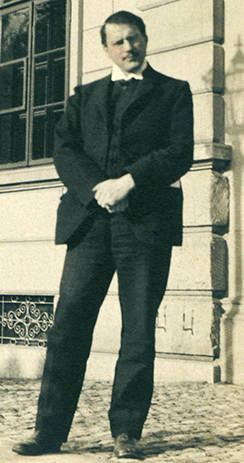| << Chapter < Page | Chapter >> Page > |
One of Adler’s major contributions to personality psychology was the idea that our birth order shapes our personality. Follow this link to view a summary of birth order theory.
As an art school dropout with an uncertain future, young Erik Erikson met Freud’s daughter, Anna Freud, while he was tutoring the children of an American couple undergoing psychoanalysis in Vienna. It was Anna Freud who encouraged Erikson to study psychoanalysis. Erikson received his diploma from the Vienna Psychoanalytic Institute in 1933, and as Nazism spread across Europe, he fled the country and immigrated to the United States that same year. As you learned when you studied lifespan development, Erikson later proposed a psychosocial theory of development, suggesting that an individual’s personality develops throughout the lifespan—a departure from Freud’s view that personality is fixed in early life. In his theory, Erikson emphasized the social relationships that are important at each stage of personality development, in contrast to Freud’s emphasis on sex. Erikson identified eight stages, each of which represents a conflict or developmental task ( [link] ). The development of a healthy personality and a sense of competence depend on the successful completion of each task.
| Stage | Age (years) | Developmental Task | Description |
|---|---|---|---|
| 1 | 0–1 | Trust vs. mistrust | Trust (or mistrust) that basic needs, such as nourishment and affection, will be met |
| 2 | 1–3 | Autonomy vs. shame/doubt | Sense of independence in many tasks develops |
| 3 | 3–6 | Initiative vs. guilt | Take initiative on some activities, may develop guilt when success not met or boundaries overstepped |
| 4 | 7–11 | Industry vs. inferiority | Develop self-confidence in abilities when competent or sense of inferiority when not |
| 5 | 12–18 | Identity vs. confusion | Experiment with and develop identity and roles |
| 6 | 19–29 | Intimacy vs. isolation | Establish intimacy and relationships with others |
| 7 | 30–64 | Generativity vs. stagnation | Contribute to society and be part of a family |
| 8 | 65– | Integrity vs. despair | Assess and make sense of life and meaning of contributions |
Carl Jung ( [link] ) was a Swiss psychiatrist and protégé of Freud, who later split off from Freud and developed his own theory, which he called analytical psychology . The focus of analytical psychology is on working to balance opposing forces of conscious and unconscious thought, and experience within one’s personality. According to Jung, this work is a continuous learning process—mainly occurring in the second half of life—of becoming aware of unconscious elements and integrating them into consciousness.

Jung’s split from Freud was based on two major disagreements. First, Jung, like Adler and Erikson, did not accept that sexual drive was the primary motivator in a person’s mental life. Second, although Jung agreed with Freud’s concept of a personal unconscious, he thought it to be incomplete. In addition to the personal unconscious, Jung focused on the collective unconscious.

Notification Switch
Would you like to follow the 'Psychology' conversation and receive update notifications?